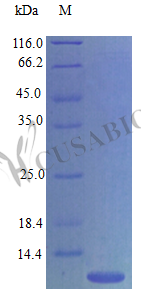Recombinant Mouse C-C motif chemokine 4 protein (Ccl4) is expressed in E. coli and represents the full length of the mature protein, spanning amino acids 24-92. This tag-free protein shows high purity of over 97%, as verified by SDS-PAGE. It appears to maintain biological activity, demonstrated through a chemotaxis bioassay using human monocytes, with an effective concentration ranging from 20-100 ng/ml. The endotoxin level stays controlled at less than 1.0 EU/µg, determined by the LAL method.
C-C motif chemokine 4 (Ccl4) is a chemokine involved in immune responses, specifically in the recruitment and migration of monocytes, T lymphocytes, and natural killer cells. It likely plays a significant role in inflammatory pathways and represents an important molecule for studying immune system functions and mechanisms. Research focusing on chemotaxis and immune cell signaling frequently makes use of this protein.
Potential Applications
Note: The applications listed below are based on what we know about this protein's biological functions, published research, and experience from experts in the field. However, we haven't fully tested all of these applications ourselves yet. We'd recommend running some preliminary tests first to make sure they work for your specific research goals.
1. Chemotaxis Assay Development and Optimization
This recombinant mouse Ccl4 protein can work as a positive control and reference standard in chemotaxis assays for studying monocyte and macrophage migration. The confirmed biological activity in the 20-100 ng/ml range using human monocytes provides a validated concentration window for experimental design. Researchers can apply this protein to establish baseline chemotactic responses and compare the activity of other chemokines or test compounds. High purity (>97%) and low endotoxin levels make it suitable for sensitive cell-based migration assays.
2. Antibody Development and Validation
The tag-free, highly pure recombinant Ccl4 protein serves as what appears to be an ideal immunogen and validation tool for developing mouse Ccl4-specific antibodies. Researchers can apply this protein for immunizing animals to generate polyclonal or monoclonal antibodies against mouse Ccl4. The protein may also function as a positive control in immunoassays such as ELISA, Western blotting, and immunoprecipitation experiments to validate antibody specificity and determine optimal working concentrations.
3. Receptor Binding Studies
This biologically active Ccl4 protein can be applied in receptor binding assays to study interactions with CCR5 and other relevant chemokine receptors. Researchers can perform competitive binding experiments, saturation binding studies, and receptor internalization assays using this protein as a ligand. The confirmed biological activity suggests that the protein maintains proper folding and receptor recognition capabilities necessary for meaningful binding studies.
4. Inflammatory Response Research Models
The recombinant mouse Ccl4 protein can be used in in vitro studies investigating inflammatory signaling pathways and immune cell activation. Researchers can apply this protein to stimulate mouse immune cells in culture to study downstream signaling cascades, gene expression changes, and cytokine production profiles. The species-matched origin (mouse) makes it particularly relevant for studies using mouse-derived cell lines or primary cells from mouse models.
5. Protein-Protein Interaction Studies
This purified Ccl4 protein may serve as a bait or target molecule in biochemical assays designed to identify and characterize protein-protein interactions. Researchers can apply techniques such as surface plasmon resonance, bio-layer interferometry, or pull-down assays to study Ccl4 interactions with other proteins, including receptors, binding partners, or regulatory molecules. The high purity and tag-free nature of the protein appears to minimize potential artifacts in interaction studies.




